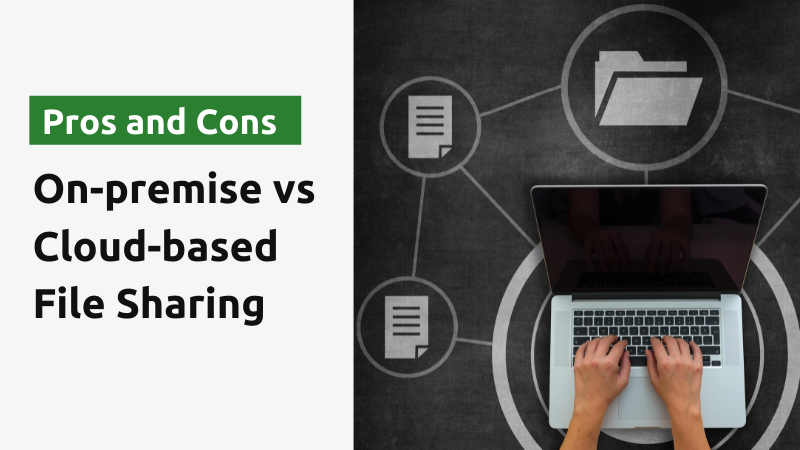When deciding on a file-sharing solution for your enterprise, the question of whether to use on-premise or cloud-based solutions arises.
In our technologically advanced world, switching to cloud-based solutions seems like the right choice, however, many companies are reluctant to switch because on-premise servers may feel more familiar or more secure.
The decision between tradition and advancement is at hand. So what should you choose?
What is on-premise file sharing?

On-premise file sharing is a method of file transfer where data is stored and accessed from dedicated servers at the workplace. Traditional file transferring (such as FTP) took place in on-premise servers before the introduction of cloud-based storage services.
Since these servers are hosted in-house, IT has full control over the security of the data being stored.
What is cloud-based file sharing?

As the name suggests, cloud-based file sharing is a method of file transfer that takes place over the cloud. Companies will adopt a third-party, cloud-based file-sharing platform where data is hosted on virtual servers. Instead of investing time and resources into managing on-premise servers, companies can opt to use cloud-based servers hosted by a third-party provider to access their information.
On-premise vs Cloud Pros and Cons
File sharing on-premise and cloud-based come with their advantages and disadvantages. Depending on your file-sharing needs, the requirements of your region, compliance standards, etc. one option may be substantially better than the other for you.
Here’s a breakdown of the pros and cons:
Accessibility
Cloud-based servers can be accessed via the internet which means users can access them regardless of location. Oftentimes, users are required to download third-party software or use a web-based application to access their files.
For file sharing solutions deployed on-premise, internet is often not required. Employees can access information if they’re connected to the workplace’s internal network.
Operation and Maintenance Costs
On-premise servers require an upfront investment for the physical infrastructure and servers. As well, the company is responsible for consistent upkeep and maintenance of the system (costs time and resources).
Cloud-based servers are operated by third-party providers and no maintenance is required by the customer. As well, cloud-based software has a larger storage scalability potential due to reduced costs.
Data Security
On-premise software has great data protection because data is stored on local servers so there is full control over security. Many on-premise users are hesitant to switch to cloud-based solutions due to their ideas of security. “If my data is floating on the internet, doesn’t that make it more susceptible to breaches?” The answer is no.
Cloud-based services can be more secure due to having more capital and resources to invest in security, instead of investing in renting physical space, purchasing physical servers etc. that companies with on-premise servers need.
Reliability
Cloud-based servers are reliant on the internet connection which may present challenges if your internet connection is slow or disconnected. Infrequently, the third-party provider cloud services provider may experience an outage. During these outages, you won’t be able to access your data.
Access to on-premise servers is not reliant on an internet connection which is preferred by some companies.
Compliance
Depending on your industry, your company may have to comply with specific regulations for protecting client information. The most common include HIPAA (U.S.), PIPEDA (CA), GDPR (EU), ISO-27001, and SOC 2.
While on-premise servers give organizations more control over how data is stored, it can be difficult to manage and maintain compliance.
Many cloud-based file sharing solution providers have dedicated teams to ensure that they’re always implementing the best security practices and complying with new industry regulations.
Summary
| On-premise File Sharing | Cloud-based File Sharing | |
|---|---|---|
Pros |
|
|
Cons |
|
|
Conclusion
When deciding whether to go with a company that uses on-premise or cloud-based servers for file sharing there are several components to consider. Depending on your needs as an individual or firm, one option may be better suited for you.
It has become much more common for companies to switch to cloud-based file sharing solutions as they don’t require as much maintenance as on-premise solutions, are very secure by industry standards, and are affordable to deploy.
TitanFile is a file-sharing provider that offers both on-premise and cloud-based file-sharing options. To learn more, contact us.
